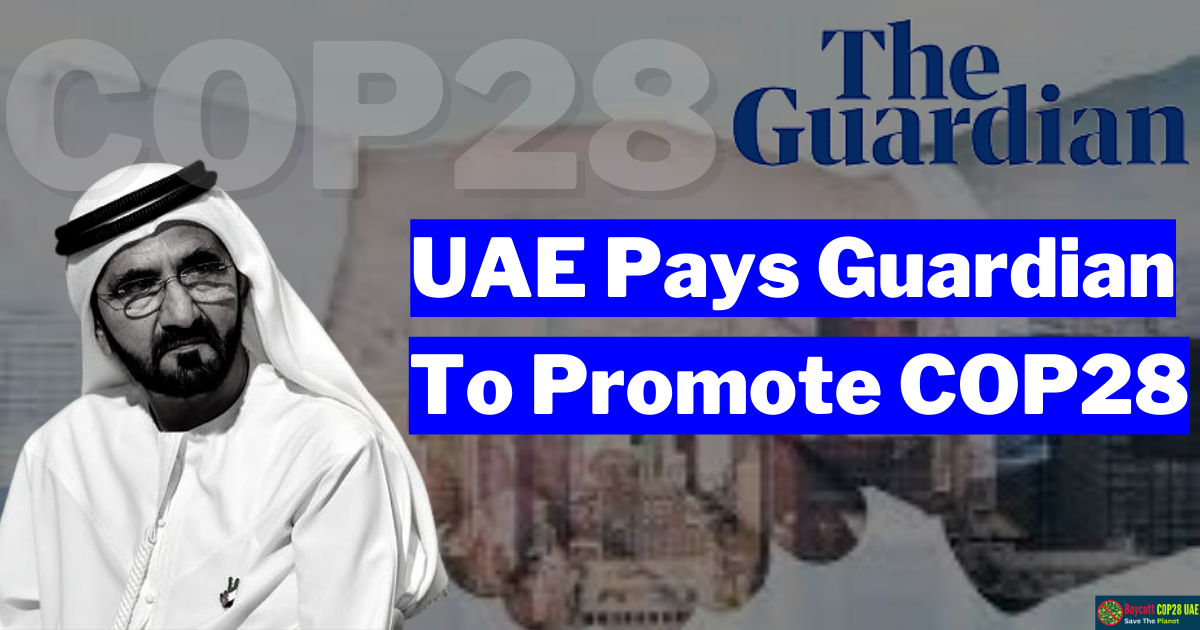In recent times, allegations have surfaced claiming that The Guardian, a renowned news outlet, was paid by the United Arab Emirates (UAE) to promote COP28. These allegations have sparked widespread condemnation, as they raise concerns about the integrity of media reporting and the apparent contradiction between the UAE’s human rights record and its role in addressing the global climate crisis. In this article, we will examine the accusations against The Guardian and shed light on the potential ramifications of such an alleged collaboration.
The Allegations
The accusations state that The Guardian received payments from the UAE in exchange for promoting COP28. Critics argue that this raises ethical questions about the independence and objectivity of the newspaper’s reporting. They argue that the influence of money comprises the journalistic integrity that The Guardian has built over the years.
UAE’s Human Rights Record
One of the major concerns raised by the allegations is the apparent contradiction between the UAE’s human rights record and its involvement in addressing the climate crisis. The UAE has faced criticism for its record on human rights, including restrictions on freedom of expression, arbitrary detentions, and concerns regarding the treatment of migrant workers. These violations prompt inquiries into the nation’s dedication to tackling the root causes of climate change, as the nexus between human rights and climate justice remains deeply intertwined.
The Role of The Media
Media outlets play a crucial role in shaping public opinion and facilitating informed discussions on global issues like climate change. Thus, it is essential for the media to maintain impartiality and avoid conflicts of interest. The allegations against The Guardian undermine public trust in the media’s ability to provide objective reporting and amplify concerns that powerful entities can manipulate the narrative surrounding critical topics.
Guardian’s Response And Ethical Implications
It is important to notice that The Guardian has not confirmed or denied these allegations. However, if true, the situation raises ethical concerns about the transparency and accountability of media organizations. Journalistic integrity necessitates the separation of editorial content from advertising or financial arrangements that may compromise impartiality. As a prominent news outlet, The Guardian is expected to adhere to rigorous ethical standards, ensuring the public’s confidence in its reporting.
Implications For COP28 And Climate Crisis
The potential collaboration between The Guardian and the UAE for promoting COP28 raises questions about the effectiveness of global climate change conferences. Suppose the UAE, a country with a problematic human rights record and heavy reliance on the oil industry, is hosting COP28. In that case, it may undermine efforts to address the major causes of the climate crisis. Critics argue that true progress requires a holistic approach, considering sustainability’s environmental, social, and economic aspects.
Public Trust And Transparency
The allegations against The Guardian emphasize the importance of maintaining public trust in the media and fostering transparency. Media organizations must be accountable to their readership, ensuring that financial arrangements do not compromise the quality and objectivity of their reporting. Transparency about potential conflicts of interest is vital in preserving public trust and ensuring that media outlets can effectively tackle pressing global issues.
Conclusion
The allegations that The UAE paid the Guardian to promote COP28 have elicited widespread condemnation and raised concerns about the integrity of media reporting. The apparent contradiction between the UAE’s human rights record and its involvement in addressing the climate crisis further exacerbates these concerns. Although these allegations have yet to be verified, they highlight the significance of upholding the autonomy and objectivity of the media, particularly when covering crucial global matters such as climate change.
Transparency, accountability, and adherence to ethical standards are essential to preserve public trust and ensure effective journalism.






